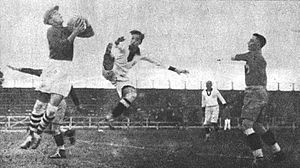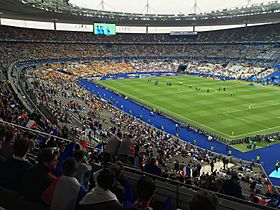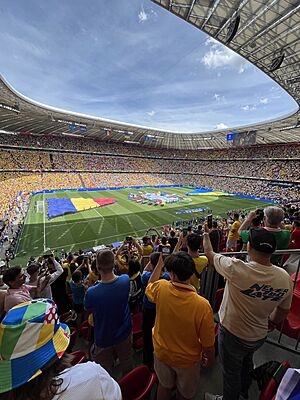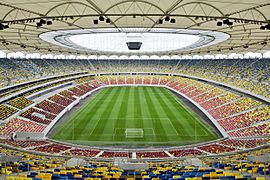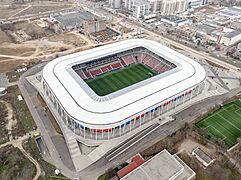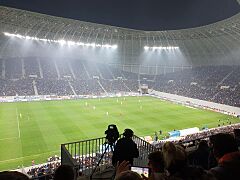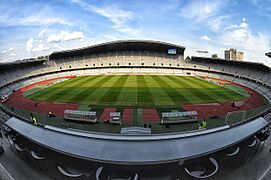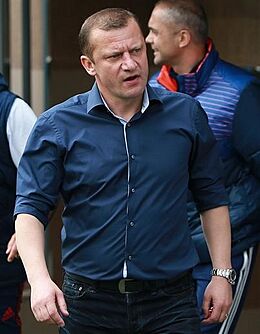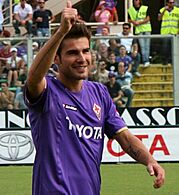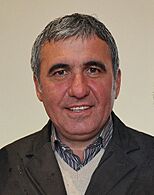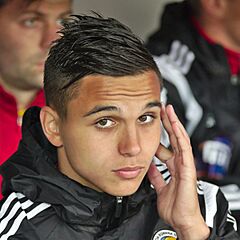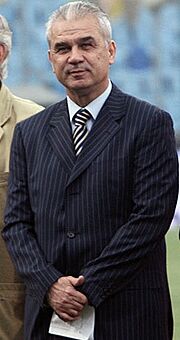Romania national football team facts for kids
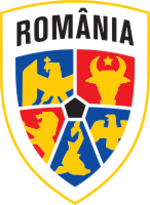 |
||||||||||||||||||||||||||||||||
| Nickname(s) | Tricolorii (The Tricolours) | |||||||||||||||||||||||||||||||
|---|---|---|---|---|---|---|---|---|---|---|---|---|---|---|---|---|---|---|---|---|---|---|---|---|---|---|---|---|---|---|---|---|
| Association | Romanian Football Federation (FRF) | |||||||||||||||||||||||||||||||
| Confederation | UEFA (Europe) | |||||||||||||||||||||||||||||||
| Head coach | Mircea Lucescu | |||||||||||||||||||||||||||||||
| Captain | Nicolae Stanciu | |||||||||||||||||||||||||||||||
| Most caps | Dorinel Munteanu (134) | |||||||||||||||||||||||||||||||
| Top scorer | Adrian Mutu Gheorghe Hagi (35) |
|||||||||||||||||||||||||||||||
| Home stadium | Various | |||||||||||||||||||||||||||||||
| FIFA code | ROU | |||||||||||||||||||||||||||||||
|
||||||||||||||||||||||||||||||||
| FIFA ranking | ||||||||||||||||||||||||||||||||
| Current | 25 |
|||||||||||||||||||||||||||||||
| Highest | 3 (September 1997) | |||||||||||||||||||||||||||||||
| Lowest | 57 (February 2011, September 2012) | |||||||||||||||||||||||||||||||
| Elo ranking | ||||||||||||||||||||||||||||||||
| Current | 33 |
|||||||||||||||||||||||||||||||
| Highest | 5 (June 1990) | |||||||||||||||||||||||||||||||
| Lowest | 49 (10 June 2017) | |||||||||||||||||||||||||||||||
| First international | ||||||||||||||||||||||||||||||||
(Belgrade, Kingdom of SCS; 8 June 1922) |
||||||||||||||||||||||||||||||||
| Biggest win | ||||||||||||||||||||||||||||||||
(Bucharest, Romania; 14 October 1973) |
||||||||||||||||||||||||||||||||
| Biggest defeat | ||||||||||||||||||||||||||||||||
(Budapest, Hungary; 6 June 1948) |
||||||||||||||||||||||||||||||||
| World Cup | ||||||||||||||||||||||||||||||||
| Appearances | 7 (first in 1930) | |||||||||||||||||||||||||||||||
| Best result | Quarter-finals (1994) | |||||||||||||||||||||||||||||||
| European Championship | ||||||||||||||||||||||||||||||||
| Appearances | 6 (first in 1984) | |||||||||||||||||||||||||||||||
| Best result | Quarter-finals (2000) | |||||||||||||||||||||||||||||||
|
Medal record
|
||||||||||||||||||||||||||||||||
The Romania national football team (also known as Tricolorii, meaning "the Tricolours") represents Romania in men's international football. The Romanian Football Federation (FRF) manages the team.
Romania is one of only four European teams that played in the very first FIFA World Cup in 1930. They have played in seven World Cups in total, with their best result being the quarter-finals in 1994. In that tournament, led by star player Gheorghe Hagi, they famously beat Argentina 3–2.
At the European Championships, Romania reached the quarter-finals in 2000. They advanced from a tough group that included Germany, Portugal, and England. They have qualified for six European Championships.
Contents
History of Romanian Football
Early Days and First World Cups
The Romanian Football Federation started in October 1909 in Bucharest. Romania played its first international match on June 8, 1922. They won 2–1 against Yugoslavia in Belgrade.
Romania had some good years in the 1930s. Coach Costel Rădulescu led them to the first three FIFA World Cup tournaments. Only Brazil, Belgium, and France also achieved this.
In the 1930 World Cup, Romania won their first game 3–1 against Peru. Goals came from Adalbert Deșu, Constantin Stanciu, and Nicolae Kovács. They then lost 4–0 to the host team, Uruguay.
Romania qualified for the 1934 World Cup by beating Yugoslavia 2–1. In the finals, they lost 2–1 to Czechoslovakia. Ștefan Dobay scored their only goal.
For the 1938 World Cup, Romania qualified easily because Egypt pulled out. However, they lost to Cuba in the finals. The first match was a 3–3 draw, but Cuba won the replay 2–1.
1970 World Cup Journey
Romania qualified for the 1970 World Cup in Mexico. They were in a very tough group with 1966 champions England, football giants Brazil, and Czechoslovakia.
England won their first match against Romania 1–0. Romania then beat Czechoslovakia 2–1 with goals from Alexandru Neagu and Florea Dumitrache. To reach the next round, they needed to beat Brazil.
Brazil played incredibly well, with Pelé scoring twice. Romania fought hard, with Dumitrache and Emerich Dembrowski scoring, but they lost 3–2 and were out of the tournament.
European Championship and World Cup Challenges (1972-1984)
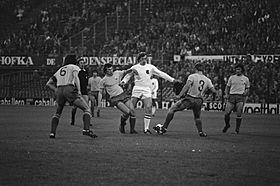
Romania struggled to qualify for major tournaments in the 1970s. They missed the 1974 and 1978 World Cups. They also had a tough time in the UEFA European Championship qualifiers.
Their only success during this period was qualifying for the European Championships in 1984 in France. They drew their first game against Spain 1–1, with Laszlo Bölöni scoring. They lost to West Germany and Portugal, which meant they did not advance from the group stage.
Return to the World Stage (1990s)
A stronger Romanian team emerged by the end of the 1980s. They qualified for their fifth World Cup in 1990. Key players included Ilie Dumitrescu, Florin Răducioiu, and the brilliant Gheorghe Hagi.
In the 1990 World Cup, Romania beat the Soviet Union 2–0. They then lost to Cameroon. In their final group game, they drew 1–1 with Argentina to reach the second round. They were eliminated by Republic of Ireland after a penalty shootout.
1994 World Cup Success
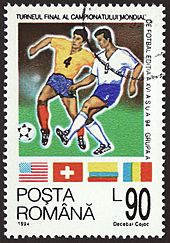
Romania qualified for the 1994 World Cup in the United States. They had a dramatic last qualifying match against Wales, winning 2–1 to secure their spot.
In the finals, Romania was one of the most exciting teams. They beat Colombia 3–1, with Hagi scoring a spectacular goal. After a 4–1 loss to Switzerland, they beat the hosts, the United States, 1–0.
In the Round of 16, they faced Argentina. Even without Diego Maradona (who was out due to a rule violation), Romania won a thrilling match 3–2. Ilie Dumitrescu scored twice, and Hagi added another.
Their journey ended in the quarter-finals against Sweden. The match ended 2–2 after extra time, with Florin Răducioiu scoring both Romanian goals. Romania lost in a penalty shootout, a heartbreaking exit.
Euro 1996 and 1998 World Cup
At Euro 1996 in England, Romania had a tough tournament, losing all three group matches. A controversial decision saw a Dorinel Munteanu shot hit the bar and bounce over the line, but the goal was not given.
Despite this, Romania had a strong qualifying campaign for the 1998 World Cup and were a top seed. They won their first two games against Colombia and England. Adrian Ilie scored a great chip against Colombia, and Dan Petrescu scored a late winner against England. They drew 1–1 with Tunisia to win their group. In the Round of 16, they lost 1–0 to Croatia.
Euro 2000 Quarter-Finals
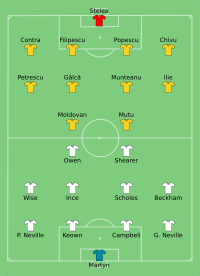
Romania had a strong qualifying campaign for Euro 2000, finishing first in their group without losing a match.
In the tournament, they were in a "group of death" with Germany, England, and Portugal. They drew 1–1 with Germany and lost to Portugal. In a must-win final group game against England, Romania won 3–2. Cristian Chivu scored early, and after England took the lead, Dorinel Munteanu equalized. In the 89th minute, Ioan Ganea scored a penalty to secure the win.
Romania reached the quarter-finals but lost 2–0 to Italy, who were runners-up in the tournament. Gheorghe Hagi, playing in his final international tournament, was sent off.
World Cup Dry Spell (2000s)
Romania struggled to qualify for major tournaments after Euro 2000. They missed the 2002, 2006, and 2010 World Cups.
Euro 2008 Qualification
Romania qualified for Euro 2008, their first major tournament since 2000. They were in a very tough group with the Netherlands, Italy, and France. They drew 0–0 with France and 1–1 with Italy. Adrian Mutu scored against Italy, but his penalty was saved later in the game. They lost 2–0 to the Netherlands and finished third in the group.
2014 World Cup Qualifiers
Romania made a good start to their 2014 World Cup qualifying campaign. They finished second in their group, earning a play-off spot. However, they lost to Greece (3–1 away, 1–1 home) and did not qualify for the finals.
UEFA Euro 2016
Romania had a strong qualifying campaign for Euro 2016, finishing second in their group without any losses. They had the best defense in the qualifiers, conceding only two goals.
At the tournament, they played the opening match against hosts France. They lost 2–1, with Bogdan Stancu scoring a penalty. They then drew 1–1 with Switzerland, with Stancu scoring another penalty. In their final group match, they needed a win against Albania to advance but lost 1–0. This meant they finished last in their group and were eliminated.
2018 FIFA World Cup Qualification
Romania's 2018 World Cup qualifying campaign was disappointing. They finished fourth in their group and did not qualify.
UEFA Nations League and Euro 2020 Qualifiers
Romania played in the first UEFA Nations League in 2018–19 and were promoted to League B. For Euro 2020 qualifiers, they were in a tough group with Spain and Sweden. They finished fourth and went to the play-offs, but lost to Iceland.
In the 2020–21 UEFA Nations League, Romania remained in League B. For the 2022 World Cup qualifiers, they finished third in their group, just missing out on a play-off spot.
2022–23 UEFA Nations League
In the 2022–23 UEFA Nations League, Romania was relegated to League C after finishing last in their group.
UEFA Euro 2024 Qualification and Tournament
Romania had a fantastic qualifying campaign for Euro 2024. They finished first in their group, ahead of Switzerland and Israel, without losing a single match. A key moment was a dramatic comeback against Switzerland, where Valentin Mihăilă scored two late goals for a 2–2 draw. They secured qualification with a 2–1 win over Israel.
At the Euro 2024 tournament, Romania was in Group E with Belgium, Slovakia, and Ukraine. In their first match against Ukraine, they achieved a stunning 3–0 victory. Nicolae Stanciu scored a beautiful long-range goal, followed by goals from Răzvan Marin and Denis Drăguș. This was only Romania's second win ever at a European Championship.
They then lost 2–0 to Belgium. In their final group match, a 1–1 draw with Slovakia was enough for both teams to qualify. Romania won the group based on goal difference and goals scored, even though all four teams had four points.
In the Round of 16, Romania faced the Netherlands and lost 3–0. Despite the loss, their performance at Euro 2024 was highly praised.
Recent Matches (2024-2025)
Romania earned promotion back to League B in the 2024–25 UEFA Nations League with a perfect record of six wins. This included a 3–0 win against Kosovo, which was awarded by UEFA after the match was abandoned due to fan incidents.
In the 2026 World Cup qualifiers, Romania started with a 0–1 home loss to Bosnia and Herzegovina. They then won 5–1 against San Marino. As of July 2025, they have played two matches in this campaign.
Team Image and Rivalries
Rivalries
Hungary
Romania's biggest rivalry is with their neighbors, Hungary. This rivalry comes from historical disagreements between the two countries, especially over the region of Transylvania. Fans from both sides often clash during matches.
The first match between them was in 1936. Hungary won that game and had many impressive wins against Romania, including Romania's biggest defeat ever, a 9–0 loss in 1948.
Romania's first win against Hungary came in 1999, a 2–0 victory. Since then, Romania has won five more times, including a notable 3–0 win in 2013.
Matches between these teams have sometimes led to fan trouble. In 2013 and 2014, there were fights between supporters.
Greece
Romania also has a notable rivalry with Greece. They have played Greece 35 times, with Romania winning 18 of those matches. Greece won 7 times, and 10 matches were draws. The two teams met in a play-off for the 2014 FIFA World Cup, where Greece won and qualified.
Minor Rivalries
Montenegro
A smaller rivalry has grown with Montenegro. They have played seven times. Montenegro eliminated Romania from the 2018 FIFA World Cup qualifiers. In the 2022–23 UEFA Nations League, Montenegro beat Romania twice.
Kosovo
Romania does not recognize Kosovo as an independent country. This has led to tension when the two teams play.
In a Euro 2024 qualifying match in September 2023, the game was stopped for almost an hour. This happened after Romanian fans displayed banners and chanted messages that caused Kosovo players to leave the field. Romania eventually won 2–0.
In September 2024, they met again in the Nations League. Kosovo fans booed the Romanian anthem. After Romania won 3–0, Kosovo fans threw objects at the Romanian team. Another match in November 2024 was also interrupted by fan behavior and fighting between players. UEFA later awarded Romania a 3–0 win for this match.
Kits
Romania's football kits are made by the Spanish company Joma since 2015. Before that, Adidas supplied their kits for thirty years. In 2017, the Romanian Football Federation introduced a new team badge. This badge shows symbols from Romania's different regions, representing the country's unity.
| Kit provider | Period |
|---|---|
| 1977–1982 | |
| 1982–2015 | |
| 2015–present |
Home Stadium
The main home stadium for the Romania national team is the Arena Națională in Bucharest. It is the largest stadium in Romania, with seats for 55,600 people. It opened in 2011 and has hosted important matches, including the 2012 Europa League final and games for Euro 2020.
Other stadiums used for home games include the Steaua Stadium (Bucharest), Ion Oblemenco Stadium (Craiova), and Cluj Arena (Cluj-Napoca).
- Romanian national team home stadiums
Coaching Staff
| Role | Name |
|---|---|
| Head Coach | |
| Assistant Coaches | |
| Goalkeeping Coach | |
| Fitness Coaches | |
| Analyst | |
| Doctor | |
| Physiotherapists | |
| Head of Performance Analysis | |
| Team Manager | |
| Kit Manager | |
| Technical Director |
Coaching History
Many coaches have led the Romanian national team since 1922. The current head coach is Mircea Lucescu.
Players
Current Squad
Here are the players currently in the squad for the 2026 FIFA World Cup qualification matches in June 2025.
| No. | Pos. | Player | Date of birth (age) | Caps | Goals | Club |
|---|---|---|---|---|---|---|
| 1 | GK | Florin Niță | 3 July 1987 | 31 | 0 | Unattached |
| 12 | GK | Horațiu Moldovan | 20 January 1998 | 14 | 0 | |
| 16 | GK | Ștefan Târnovanu | 9 May 2000 | 3 | 0 | |
|
|
||||||
| 2 | DF | Andrei Rațiu (captain) | 20 June 1998 | 31 | 1 | |
| 3 | DF | Mihai Popescu | 7 May 1993 | 4 | 1 | |
| 4 | DF | Virgil Ghiță | 4 June 1998 | 3 | 0 | |
| 5 | DF | Ionuț Nedelcearu | 25 April 1996 | 27 | 2 | |
| 14 | DF | Valentin Crețu | 2 January 1989 | 2 | 0 | |
| 15 | DF | Andrei Burcă | 15 April 1993 | 41 | 1 | |
| 17 | DF | Vladimir Screciu | 13 January 2000 | 4 | 0 | |
| 20 | DF | Raul Opruț | 4 January 1998 | 4 | 0 | |
|
|
||||||
| 6 | MF | Marius Marin | 30 August 1998 | 31 | 0 | |
| 8 | MF | Adrian Șut | 30 April 1999 | 7 | 0 | |
| 10 | MF | Dennis Man | 26 August 1998 | 37 | 10 | |
| 11 | MF | David Miculescu | 2 May 2001 | 2 | 0 | |
| 13 | MF | Valentin Mihăilă | 2 February 2000 | 31 | 5 | |
| 18 | MF | Răzvan Marin | 23 May 1996 | 68 | 12 | |
| 19 | MF | Florin Tănase | 30 December 1994 | 21 | 5 | |
| 21 | MF | Vlad Chiricheș | 14 November 1989 | 77 | 0 | |
| 22 | MF | Alexandru Mitriță | 8 February 1995 | 25 | 4 | |
| 23 | MF | Deian Sorescu | 29 August 1997 | 21 | 0 | |
|
|
||||||
| 7 | FW | Denis Alibec | 5 January 1991 | 45 | 6 | |
| 9 | FW | Denis Drăguș | 6 July 1999 | 24 | 5 | |
Recent Call-ups
These players were called up for the team in the last 12 months.
| Pos. | Player | Date of birth (age) | Caps | Goals | Club | Latest call-up |
|---|---|---|---|---|---|---|
| GK | Răzvan Sava | 21 June 2002 | 0 | 0 | v. |
|
| GK | Laurențiu Popescu | 18 January 1997 | 0 | 0 | v. |
|
|
|
||||||
| DF | Nicușor Bancu INJ | 18 September 1992 | 47 | 2 | v. |
|
| DF | Alexandru Chipciu | 18 May 1989 | 47 | 6 | v. |
|
| DF | Adrian Rus | 18 March 1996 | 22 | 1 | v. |
|
| DF | Denis Ciobotariu | 10 June 1998 | 1 | 0 | v. |
|
| DF | Radu Drăgușin | 3 February 2002 | 27 | 1 | v. |
|
| DF | Cristian Manea | 9 August 1997 | 25 | 2 | v. |
|
| DF | Alexandru Pașcanu | 28 September 1998 | 1 | 0 | v. |
|
| DF | Matei Ilie | 11 December 2002 | 0 | 0 | v. |
|
| DF | Iulian Cristea | 17 July 1994 | 4 | 0 | v. |
|
|
|
||||||
| MF | Nicolae Stanciu SUS | 7 May 1993 | 82 | 15 | v. |
|
| MF | Ianis Hagi | 22 October 1998 | 47 | 6 | Unattached | v. |
| MF | Olimpiu Moruțan | 25 April 1999 | 16 | 1 | v. |
|
| MF | Vlad Dragomir | 24 April 1999 | 1 | 0 | v. |
|
| MF | Dennis Politic | 5 March 2000 | 1 | 0 | v. |
|
| MF | Darius Olaru | 3 March 1998 | 26 | 0 | v. |
|
| MF | Florinel Coman | 10 April 1998 | 20 | 2 | v. |
|
| MF | Victor Dican | 11 October 2000 | 0 | 0 | v. |
|
| MF | Andrei Artean | 14 August 1993 | 0 | 0 | v. |
|
| MF | Mihai Lixandru INJ | 5 June 2001 | 0 | 0 | v. |
|
|
|
||||||
| FW | Daniel Bîrligea INJ | 19 April 2000 | 4 | 1 | v. |
|
| FW | Louis Munteanu INJ | 16 June 2002 | 1 | 0 | v. |
|
| FW | George Pușcaș | 8 April 1996 | 46 | 11 | v. |
|
|
||||||
Records
Most Appearances
- Dorinel Munteanu holds the record for most games played, with 134 appearances.
- Gheorghe Hagi is second with 124 games.
Most Goals
- Adrian Mutu and Gheorghe Hagi are the top goalscorers, both with 35 goals.
- Iuliu Bodola is third with 31 goals.
Youngest Players to Debut
- Enes Sali is the youngest player to ever play for Romania. He made his debut at 15 years, 8 months, and 22 days old in 2021.
- Cristian Manea was the youngest before him, debuting at 16 years, 9 months, and 22 days in 2014.
Managers with Most Matches
- Anghel Iordănescu has managed Romania in the most matches, with 101 games.
- Victor Pițurcă is second with 95 matches.
Honours
Regional Titles
- Balkan Cup
- Champions (4): 1929–31, 1933, 1936, 1977–80
Friendly Tournament Wins
- Mohammed V Cup: 1977
- Tournoi de Paris: 1983
- King's Cup: 1996
- Cyprus International Football Tournament: 2001, 2004, 2006
See also
 In Spanish: Selección de fútbol de Rumania para niños
In Spanish: Selección de fútbol de Rumania para niños
- Romania Olympic football team
- Romania national under-21 football team
- Romania women's national football team
 | John T. Biggers |
 | Thomas Blackshear |
 | Mark Bradford |
 | Beverly Buchanan |


